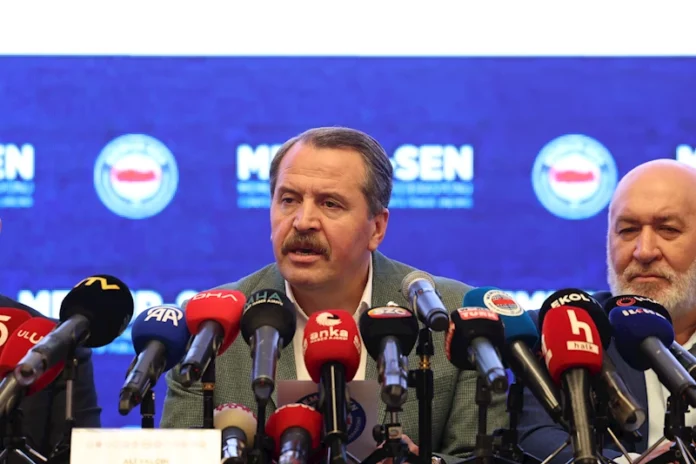Public sector unions and the main opposition party in Turkey have accused the government of President Recep Tayyip Erdoğan of condemning millions to poverty with the pay raises set for civil servants and retirees for 2026–2027, Turkish Minute reported on Wednesday.
After wage talks with civil servants ended in deadlock, the dispute over 2026–2027 pay raises between the government and Memur-Sen, Turkey’s largest civil servants’ union, was referred to the Public Servants Arbitration Board for a binding decision last week. The board on Wednesday announced that salaries would rise by 11 percent in the first half of 2026 and 7 percent in the second half, followed by 5 percent and 4 percent increases in the two halves of 2027. The decision also included a TL 1,000 ($24) raise in base salaries and minor adjustments to benefits such as language compensation and allowances for families with disabled children.
The decision, which attracted criticism from unions and the main opposition Republican People’s Party (CHP), came after Memur-Sen demanded an 88 percent raise for 2026 and 46 percent for 2027, with six-monthly increases of 25 and 20 percent in 2026 and 20 and 15 percent in 2027. The union also called for higher base salaries, a 10,000-lira rise plus a 10 percent prosperity share at the start of 2026 and a 7,500-lira rise at the start of 2027, as well as a monthly 2,925-lira collective agreement bonus and 17,600 lira in housing support, in addition to other allowances.
A prosperity share is a type of payment made in addition to employees’ regular wages, typically intended to compensate for losses in purchasing power caused by inflation or economic crises. This payment is designed to improve workers’ living standards and ensure a higher level of well-being.
Union leaders and a CHP lawmaker voiced their criticism during a protest staged by the United Public Workers Confederation (Birleşik Kamu-İş) in front of the finance ministry in Ankara, where civil servants gathered on Wednesday to denounce the board’s decision.
Orhan Yıldırım, the head of Birleşik Kamu-İş, accused the government of running a wage-setting system that leaves public employees impoverished by excluding the right to strike and handing disputes to an arbitration board stacked in favor of the authorities. He said the collective bargaining process had long been reduced to “theater,” adding that his confederation refused to simply play along and declined to legitimize talks that he argued were staged in a way that workers could never win.
Yıldırım added that his union stood with ordinary citizens struggling with rent and groceries rather than “those living in villas and riding in official cars.” He said their demands were straightforward: a wage that allows families to live with dignity, pay for housing and the ability to meet school expenses without falling into debt. He also linked the deepening economic hardship to Turkey’s presidential system, arguing that promises of prosperity under the model had instead left “80 million people living below the poverty and hunger lines.” Holding Erdoğan personally accountable, Yıldırım said the government’s economic course was designed to protect the ruling elite while condemning millions to poverty.
Kadem Özbay, head of the Eğitim-İş teachers union, likewise directed his criticism at Erdoğan, saying the arbitration process had merely confirmed what workers already expected. He stated that millions were being pushed away from decent living conditions and accused the government of maintaining what he called a “one-man regime” that channels public resources into palace luxuries instead of citizens’ needs.
Yalçın Karatepe, deputy chairman of the CHP, also said the arbitration board’s ruling once again showed that public employees were facing what he called “organized wrongdoing.” He argued that while one side of this scheme was formed by the government and its economic managers, the other was made up of groups “that bear the name of a union but have nothing to do with unionism.” Karatepe stressed that the board’s decision had no legitimacy, warning that the imposed pay rises would condemn civil servants to poverty.
Through a referendum in April 2017, Turkey switched from a parliamentary system of governance to an executive presidential system that granted Erdoğan and his AKP government sweeping powers and was criticized for removing constitutional checks and balances, thus leading to a further weakening of Turkish democracy.
Over the past several years, Turkey has been suffering from backsliding in its economy, with high inflation and unemployment as well as a poor human rights record. Erdoğan is criticized for mishandling the economy, emptying the state’s coffers and establishing one-man rule in the country where dissent is suppressed and opponents are jailed on politically motivated charges.
According to the July figures of the Confederation of Turkish Labor Unions (TÜRK-İŞ), Turkey’s largest labor confederation, the hunger threshold in Turkey, stood at TL 26,413 ($665), exceeding the current monthly minimum wage of TL 22,104 ($574). The hunger threshold is the amount a family of four needs to spend on food for a healthy and balanced diet.
The poverty line, which includes additional expenses such as housing, transportation, clothing, education and healthcare, was calculated at TL 86,036 ($2,167).
Turkey is known for its relatively high percentage of the workforce making the minimum wage. Labor unions estimated that roughly half of all workers earn a wage similar to the minimum wage.















